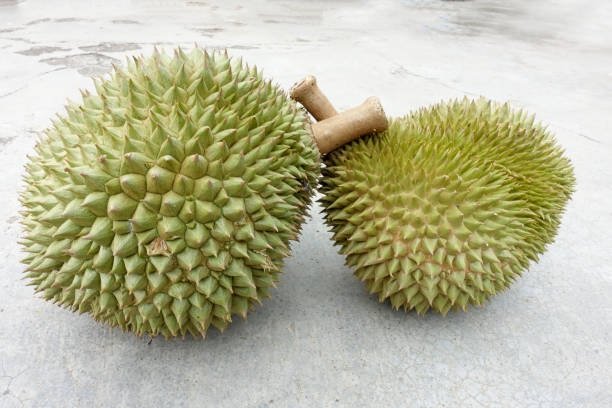🌴 Unlock the secrets of Durian fruit!🍈 Explore its unique taste, health benefits, and delectable recipes. Your taste buds will thank you!👅💪🍽️
Durian Fruit
Durian, often hailed as the ‘king of fruits,’ stands out due to its distinctive smell and unique taste. Native to Southeast Asia, durian features a spiky, hard shell that encases its creamy, custard-like flesh. This tropical fruit is renowned for its complex flavour profile, which can be both sweet and savoury, making it a fascinating and sometimes polarizing food experience, particularly the mao shan wang durian.
Background of Durian Fruit
Durian is native to Southeast Asia, thriving in countries like Thailand, Malaysia, and Indonesia. The fruit is cultivated in tropical climates with high humidity and rich soil. Understanding these cultivation areas helps in appreciating the specific growing conditions that contribute to durian’s unique flavour and texture. Sustainable farming practices in these regions are crucial for maintaining the quality and availability of durian.
Description and Unique Taste Profile
Durian’s taste is one of its most talked-about features. Its flavour profile is a complex blend of sweet, creamy, and sometimes savoury notes, often compared to a mix of almonds, cheese, and caramel. The texture is custard-like, adding to its rich mouthfeel. This unique combination creates an extraordinary eating experience that can be both delightful and challenging to those unaccustomed to its distinctive characteristics.
Health Benefits of Durian Fruit
Nutritional Composition of Durian Fruit
Durian is packed with nutrients that offer various health benefits. It is rich in vitamins C and B, potassium, and dietary fibre. The fruit also contains healthy fats, antioxidants, and carbohydrates, contributing to overall well-being. The high fibre content aids in digestion, while the vitamins and minerals support immune function and energy levels. Including durian in a balanced diet can be a nutritious choice.
Dispelling the Myths: Durian Fruit
Addressing Common Misconceptions About Durian Fruit
Durian often faces misconceptions, particularly concerning its odour and taste. While the fruit does have a strong smell that some find off-putting, many people enjoy its rich and sweet flavour. The aroma can be polarizing, but it is often described as complex and intriguing rather than unpleasant. Understanding these misconceptions can help appreciate durian’s true qualities.
Scientific Facts Versus These Myths
Scientific research into durian has revealed that its smell, while strong, is a result of sulfur compounds and esters. These elements contribute to its distinctive aroma but do not necessarily indicate spoilage or unpleasantness. The myths surrounding durian often stem from cultural perceptions rather than scientific evidence. By contrasting these myths with scientific facts, we can gain a clearer understanding of this unique fruit.
Delicious Durian Recipes
Guidance on How to Select and Store a Durian
Selecting a ripe durian involves looking for a strong aroma and a slight softness to the touch. The fruit should emit a pungent smell, indicating ripeness. To store durian, keep it in a cool place or refrigerate it to maintain freshness. Proper storage helps preserve its unique flavour and prevents odour from spreading to other foods.
Enjoying Durian Responsibly
Advised Consumption Quantities
Durian is rich and calorically dense, so consuming it in moderation is recommended. A small serving, such as a few spoonfuls or a slice, can provide a satisfying taste without excessive calorie intake. Balancing durian with other fruits and foods ensures a well-rounded diet.
Potential Allergies or Side Effects
While durian is generally safe to eat, some individuals may experience allergies or side effects. Common symptoms include digestive discomfort or allergic reactions in sensitive individuals. It’s important to monitor any adverse reactions and consult a healthcare professional if necessary.
When to Avoid Eating Durians
Certain individuals should avoid eating durians, including pregnant women, those with digestive issues, or individuals with known allergies to the fruit. Additionally, it’s advisable to avoid consuming durian before engaging in physical activities due to its potential to cause discomfort.
Durian’s strong odour is due to a combination of sulfur compounds and esters. These volatile compounds create a distinctive and potent smell, which can be off-putting to some but intriguing to others. The scent is part of the fruit’s unique profile and contributes to its overall character.
Durian is banned in many parts of the U.S. due to its strong odour, which can linger and affect environments like hotels and public transportation systems. The fruit’s smell can be overpowering to some people, leading to restrictions on its presence in certain public areas.
Durian’s taste is often described as rich and creamy, with sweet, custard-like notes. Some people find the flavour complex and enjoyable, while others may be put off by the strong odour. The taste is unique and can be an acquired preference for many.
Durian and jackfruit are distinct tropical fruits, despite both being members of the Moraceae family. Durian is known for its strong smell and rich, creamy taste, while jackfruit has a milder aroma and a fibrous, sweet flavour. Their differences in taste, texture, and odour set them apart in the world of tropical fruits.

